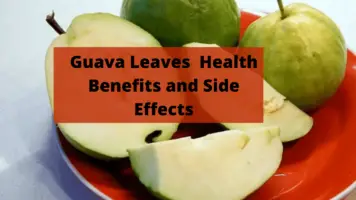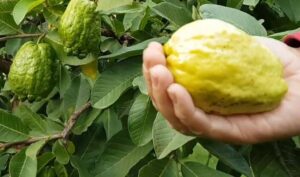In this post, we are going to focus on providing information about guava benefits and side effects.
Overview
The guava leaves are greenish part of the common tropical and subtropical tree, which provide guava plant with support and protection. It also assists in carrying out other important physiological functions such as photosynthesis and transpiration.
Guava leaves not only help guava trees to carry out life activities but also a reservoir of many essential nutrients, which when supplemented animals with can provide a source of dietary vitamins, minerals, soluble fibers, antioxidants.
Learn more about the nutritional value of guava leaves and fruits here
But, before we jump right into the content,
do guava leaves really have health benefits and side effects?
Let us try to kick the bad news about guava leaves out of the way: side effects of guava leaves.

What are the Side Effects of Guava Leaves?
Generally, guava leaves considered safe and many scientific studies have proven the safety of guava leaves.
However, lack of proper consultation following guidelines before using guava leaves may result in the followings:
Constipation
As you may know, to take any medication at the right dosage or as you are recommended to take is the first step to preventing yourself from the effects of adverse drug reactions.
Likewise consumption of guava leaves is not an exception.
People who took guava leaves in excess typically more than 3 cups were found to suffer from constipation. However, this condition is not common as it only occurs in some people.
Allergic Reactions
People who are suffering from underlying medical skin conditions such as Eczema were also found to develop a mild allergic response. This is also very rare.
This is because some were found to use guava leaves in order to treat Eczema. And the result obtained was promising.
Additionally, some people are naturally or genetically allergic to guava leaves.
And so such people, when they apply guava leaves on their skin, may experience irritation or redness. And this increases their chances of becoming allergic to guava leaves.
Drug Interactions
Guava leaves contain high amount of Vitamin C.
Find out more about Vitamins in guava fruits and leaves
And so taking guava leaves and drugs that inhibit the metabolism of Vitamin C may help cause some health-related issues.
Some of the drugs that interact with Vitamin C are: Digoxin, VincristineFexofenadine, Indinavir, Colchicine, Paclitaxel, and Topotecan.
Pregnancy and Guava Leaves
guava leaves are also safe to be used before the pregnancy. This is because the leaf tea helps improve fertility and blood flow to the uterine muscles. It was shown to supplement pregnant women with folate.
However, safety during pregnancy is unknown and should be taken under guidelines from your home doctor.
Breastfeeding and Guava Leaves: the use of guava leaves during breastfeeding is clearly not understood. Breastfeeding mothers who went ahead to take guava leaves tea should do so only with proper advice and directives from a qualified medical practitioner.
Main points: guava leaves are generally safe. However, if taken without caution and without following the recommended guidelines a lot of health-related issues may be occurred.
Guava Leaves Benefits
The health benefits of guava leaves are numerous. This can be understood when we discuss guava leaves benefits base on the nutritional value.
Let’s start with health benefit number 1:
Soluble fibers: guava leaves contain fibers, which are medically proven to be good for health.
The soluble fibers that are present in guava leaves were shown to improve memory functions and prevent infections.
This 2013 study reported that guava leaves can help fight against infections and memory functions.
Additionally, according to the 2010 review, it was shown that dietary fibers can improve the nutrients absorption and rate of the bowel passage.
This shows that fibers can improve bowel movement and metabolism.
Main points: guava leaves contain soluble fibers and these fibers are good for proper metabolism, bowel passage, memory functions, and infection prevention.
Lycopene: guava leaves contain lycopene, which is a powerful free radical scavenging agent.
Lycopene possesses many health benefits, which include improving skin tone and the prevention of cancers.
One study showed that the roles lycopene played in reducing atherosclerosis, hypertension, metabolic problems, stroke, and peripheral vascular diseases.
This study reviewed the potential benefits of lycopene for prostate cancers and the result found was promising.
It was also shown in this study that lycopene reduced the growth of cancer cells.
One 2019 review also compared the role of circulating lycopene and cognitive thinking while evaluating four studies.
Out of the four studies evaluated, 3 studies showed that lycopene reduced inflammation and oxidative stress.
And these factors are among the leading causes of low cognitive thinking.
Main points: guava leaves contain a high amount of lycopene, which is important for preventing prostate cancers and the management of cognitive thinking.
Folate (folic acid): the folic acid is an important vitamin found in guava fruits and leaves. This vitamin is very essential for blood production.
It is good for improving blood flow to the uterus muscles. It helps women during pregnancy as it helps stabilize the metabolic problems of the fetus and its mother.
One 2011 review showed that supplementation of folic acid prevented fetal structural anomalies and congenital heart defects.
And one study showed the potential effects that can occur to pregnant women in the absence of folate.
This clearly showed that this vitamin that can be found in guava leaves is essential for healthy delivery.
Main points: guava leaves contain folate, which is an important vitamin that can play a major role in the body and especially during pregnancy.
It is important to note that most healthcare personnel recommend folate that is found in guava fruits. However, if your doctor gives you permission to take the leaves of guava, you can take it.
Vitamin C: guava leaves and fruits are also high in vitamin C. And this vitamin C is important for healthy teeth and heart functions.
Vitamin C was also shown to improve memory. You can check this 2013 review if you want to learn more about the health benefits of Vitamin C.
Main points: guava leaves and fruits are high in vitamin C, which is important for the management of heart diseases and teeth problems.
Other important vitamins that can be found in guava fruits and leaves are B complexes, E, D, and K.
Learn more about the nutrients content of guava fruits and leaves:
>Minerals And Vitamins In Guava Fruits And Leaves
>List Of Antioxidants In Guava Leaves And Fruits
Carotene: Carotene is also an important component in many leaves of plants. Guava leaves also contain a high amount of carotene.
You can find more information about carotene here
It is widely used to treat various skin diseases and in reducing oxidative stress.
Main points: guava leaves contain carotene, which is a powerful molecule that helps reduce oxidative stress and skin related issues.
Flavonoids: these are antioxidants, which are present in guava leaves.
They are important for the management of a wide variety of diseases, which include free radicals scavenging and prevention of infections.
They are also anticarcinogenic, which means flavonoids can prevent the growth of cancer cells.
You can find more information about the health benefits of flavonoids here
Main points: guava leaves contain flavonoids, which are good antioxidants that help fight against numerous cancers, infections, and oxidative stress in the body.
Terpenoids: guava leaves are also high in terpenoids. Terpenoids are also important antioxidants found in guava leaves, which help fight skin cancers, infertility, infections, and inflammation.
This study summarized the most important terpenes and their sources. Terpenoids are useful for healthy metabolism and are good antispasmodic, astringent, and antiseptic agents.
Main points: guava leaves contain terpenoids and these terpenoids are good for preventing swelling, cancers, and muscular pain in the body.
Minerals: minerals are also important elements with numerous health benefits. They are found in guava leaves at high quantity especially potassium.
Common minerals that can be found in guava leaves include Iron, Zinc, Selenium, Calcium, Copper, Manganese, and Molybdenum.
Find more information about the minerals content in guava
Minerals are important for proper nerve functions and hormones productions. Some minerals are essential for the production of hormonal glands and enzymes’ functions.
Main points: guava leaves contain minerals in high quantity and so adding guava leaves and fruits may help supplement you with dietary minerals.
Conclusion
We hope that this guide gives an excellent help in understanding guava benefits and side effects. We would love to hear from you your questions and views. So, do write to us in the comment section below.
You may like reading:
>Health Benefits Of Guava Leaves For Inflammation
>Guava Leaves For Kidney Problems: Is There Any Health Benefits?
>Health Benefits Of Guava Leaves For Prickly Heat
>How To Use Guava Leaves For Pimples
>Guava Leaves For Prostate Cancer: Find Out The Health Benefits
>Guava Leaf Tea: The Detailed Guide To Preparation, Uses, And Side Effects
>How To Use Guava Leaves For Diabetes
References
Kaczmarczyk MM, Miller MJ, Freund GG. The health benefits of dietary fiber: beyond the usual suspects of type 2 diabetes mellitus, cardiovascular disease and colon cancer. Metabolism. 2012;61(8):1058-1066. doi:10.1016/j.metabol.2012.01.017 https://www.ncbi.nlm.nih.gov/pmc/articles/PMC3399949/
Lattimer JM, Haub MD. Effects of dietary fiber and its components on metabolic health. Nutrients. 2010;2(12):1266-1289. https://www.ncbi.nlm.nih.gov/pmc/articles/PMC3257631/
Mozos I, Stoian D, Caraba A, Malainer C, Horbańczuk JO, Atanasov AG. Lycopene and Vascular Health. Front Pharmacol. 2018;9:521. Published 2018 May 23. https://www.ncbi.nlm.nih.gov/pmc/articles/PMC5974099/#:~:text=Lycopene%20has%20several%20cardiovascular%20beneficial,cholesterol%20synthesis)%20and%20blood%20pressure
Holzapfel NP, Holzapfel BM, Champ S, Feldthusen J, Clements J, Hutmacher DW. The potential role of lycopene for the prevention and therapy of prostate cancer: from molecular mechanisms to clinical evidence. Int J Mol Sci. 2013;14(7):14620-14646. Published 2013 Jul 12. https://www.ncbi.nlm.nih.gov/pmc/articles/PMC3742263/
Crowe-White, Kristi M et al. “Lycopene and cognitive function.” Journal of nutritional science vol. 8 e20. 29 May. 2019, https://www.ncbi.nlm.nih.gov/pmc/articles/PMC6558668/
Greenberg JA, Bell SJ, Guan Y, Yu YH. Folic Acid supplementation and pregnancy: more than just neural tube defect prevention. Rev Obstet Gynecol. 2011;4(2):52-59. https://www.ncbi.nlm.nih.gov/pmc/articles/PMC3218540/
Arya, Shalini & Krishna Kumar, Pavitra. (2012). Folate: Its health benefits. Agro Food Industry Hi Tech. 23. https://www.researchgate.net/publication/230794212_Folate_Its_health_benefitsbenefits
Chambial S, Dwivedi S, Shukla KK, John PJ, Sharma P. Vitamin C in disease prevention and cure: an overview. Indian J Clin Biochem. 2013;28(4):314-328. https://www.ncbi.nlm.nih.gov/pmc/articles/PMC3783921/
Kim JK. An update on the potential health benefits of carotenes. EXCLI J. 2016;15:1-4. Published 2016 Jan 6. https://www.ncbi.nlm.nih.gov/pmc/articles/PMC4817424/
Panche AN, Diwan AD, Chandra SR. Flavonoids: an overview. J Nutr Sci. 2016;5:e47. Published 2016 Dec 29. doi:10.1017/jns.2016.41
MLA Panche, https://www.ncbi.nlm.nih.gov/pmc/articles/PMC5465813/
Cox-Georgian D, Ramadoss N, Dona C, Basu C. Therapeutic and Medicinal Uses of Terpenes. Medicinal Plants. 2019;333-359. Published 2019 Nov 12. doi:10.1007/978-3-030-31269-5_15 https://www.ncbi.nlm.nih.gov/pmc/articles/PMC7120914/
Ryan-Harshman M, Aldoori W. Health benefits of selected minerals. Can Fam Physician. 2005;51(5):673-675.





Comments
Like!! I blog frequently and I really thank you for your content. The article has truly peaked my interest.
Do guava leaves help in reducing the belly fat?
Author
Yes, it can help cut down tummy and improve cholesterol and glucose metabolism. And these glucose and cholesterol are the most important factors for causing weight gain and fat accumulation.
And if so what could be the procedure
Author
If you want to use guava leaves for
weight loss, you need to find 15-20 green and fresh guava leaves. Wash them properly with water preferably running water to wash away all latex, pollen, fungi, and bacteria. Then, place the leaves in a boiling pot and boil for 15 minutes on heat. After this specified time, remove the pot from heat and allow the decoction to cool down to room temperature before you drink. Drink two cups daily and stop when you feel satisfied. But, while drinking this decoction, you need to avoid carbs, red meat, and refined foods. Participate in healthy exercise.